
The CBS Knowledge Repository is a curated digital platform by TERI’s Council for Business Sustainability (CBS), designed to equip businesses with actionable knowledge on sustainability and climate leadership. This comprehensive repository offers a wide range of curated resources including discussion papers, policy briefs, and trend reports. Flagship publications like the “A–Z of Sustainability” help demystify complex sustainability terminology, while periodic insights from the resources provides members with emerging trends in climate action, regulatory developments, decarbonization strategies, nature-based solutions, and responsible business conduct.
By bridging science, policy, and business insights, the repository supports CBS member companies in aligning with national and global sustainability goals. It serves as a practical tool for informed decision-making and mainstreaming sustainability across corporate strategies.
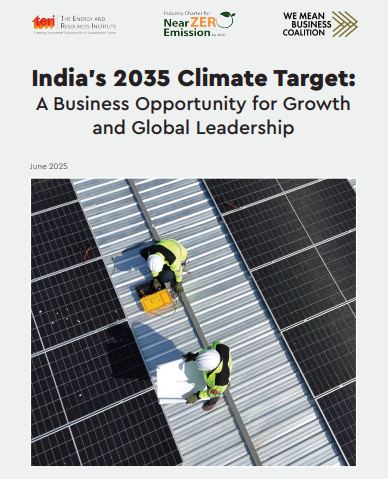 | India’s 2035 Climate Target: A Business Opportunity for Growth and Global Leadership | India has met its current NDC goals and is poised to set an ambitious 2035 NDC. This TERI-We Mean Business briefing recommends the government use the new target to align climate goals with economic priorities. The NDCs must be actionable, driving business investment and leadership in green solutions. |
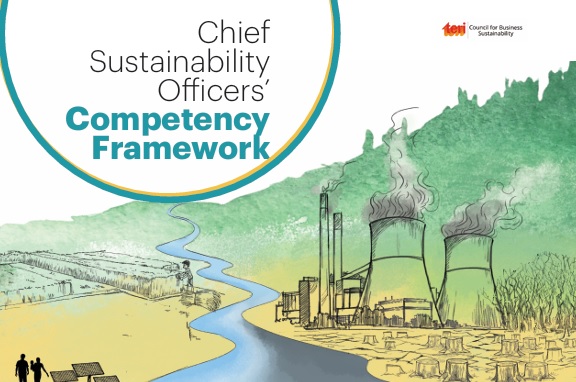 | Chief Sustainability Officers’ Competency Framework | The sector-agnostic Chief Sustainability Officers’ Competency Framework attempts to define the roles and responsibilities of a Chief Sustainability Officer and the aspirational skills, competencies, and attributes of an individual for delivering successfully on the role of driving the corporate sustainability agenda and steering ahead the organization towards a green and sustainable economy regime. |
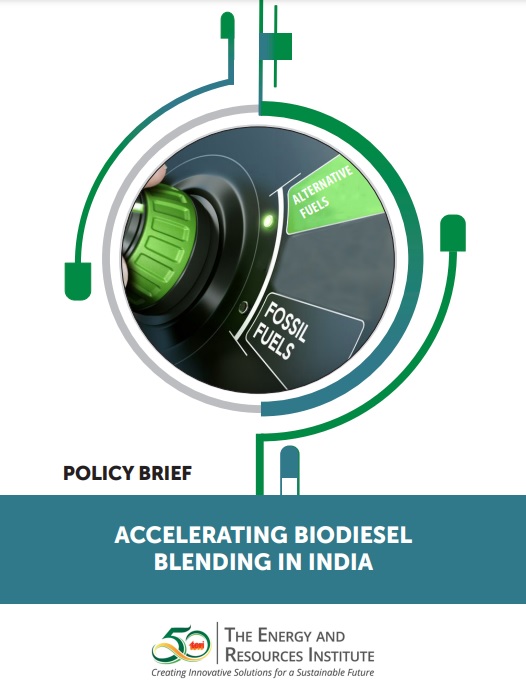 | Accelerating Biodiesel Blending in India | Biodiesel is a promising solution for India’s energy security and climate goals. This TERI brief urges scaling up biodiesel blending, leveraging used cooking oil and waste as feedstocks. It recommends actionable steps to overcome barriers like feedstock availability and infrastructure gaps, supporting India’s sustainability ambitions. |
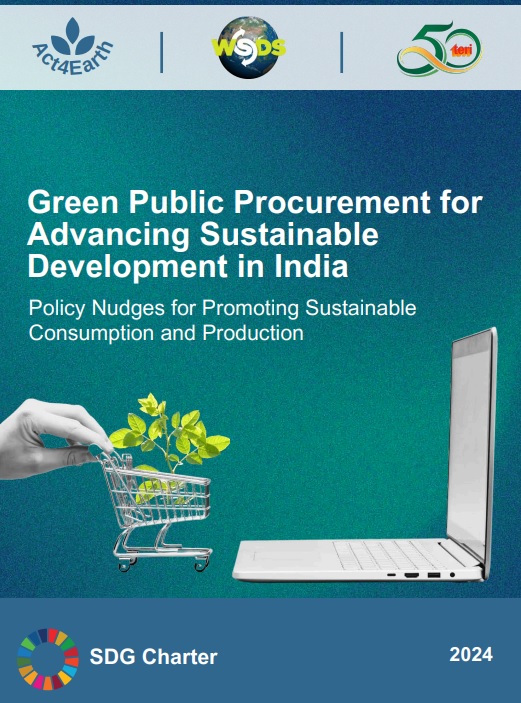 | Green Public Procurement for Advancing Sustainable Development in India: Policy Nudges for Promoting Sustainable Consumption and Production | As public procurement is 20−22 per cent of GDP, Green Public Procurement (GPP) is key to India’s sustainable growth. This TERI brief offers a structured GPP framework to embed environmental criteria across governance and lifecycle stages. Implementing these recommendations will help India achieve SDG 12.7 and elevate its sustainability agenda. |
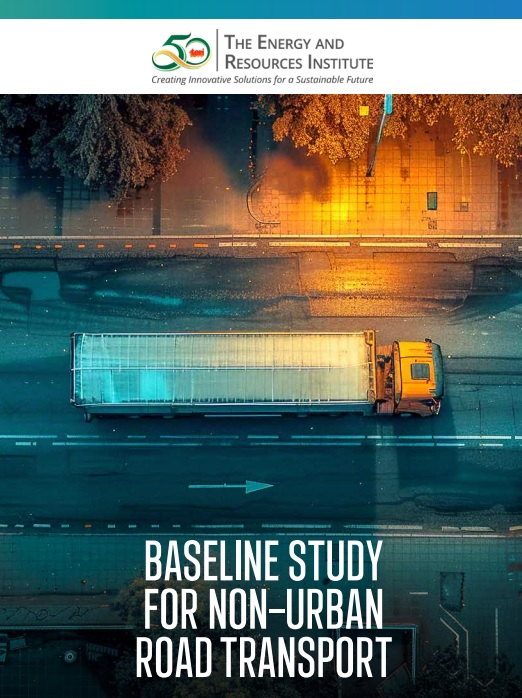 | Baseline Study for Non-Urban Road Transport | India’s heavy-duty road-freight faces high emissions and inefficiency. This TERI study maps challenges like excessive idling and underpowered trucks. It recommends driver training, fleet aggregation, and phasing out outdated vehicles to establish an evidence base for cleaner, more efficient, and sustainable freight logistics. |
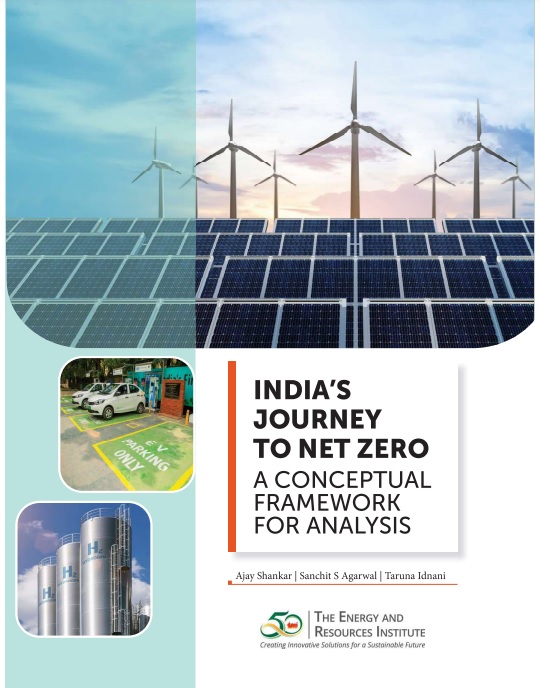 | India’s Journey to Net Zero: A Conceptual Framework for Analysis | Committed to Net-Zero by 2070 amid rapid growth, India must strategically decouple emissions from the economy. This TERI framework outlines pathways for major sectors like electricity and transport. It calls for sector-wise modelling, climate finance, and innovation like green hydrogen to enable a sustainable, low-carbon future. |
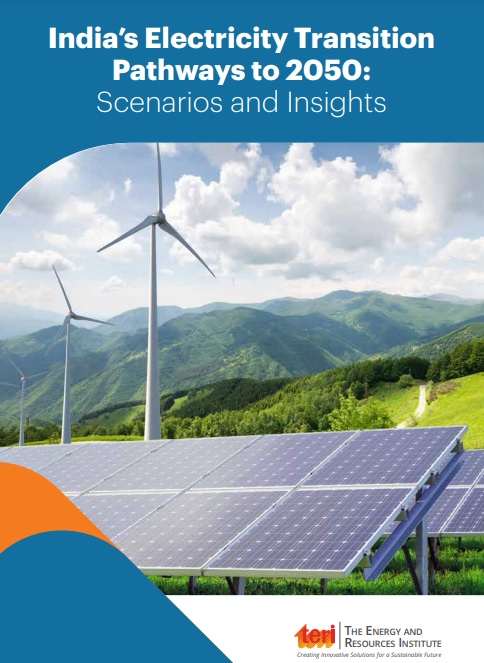 | India’s Electricity Transition Pathways to 2050: Scenarios and Insights | Facing surging demand, India’s power sector needs $1.2–$1.6 trillion investment by 2050. This TERI-Bloomberg study projects fourfold demand growth. It highlights the pivotal role of renewables, battery/hydro storage, and flexible capacity alongside coordinated federal policy to ensure a secure, affordable, and sustainable clean energy transition. |
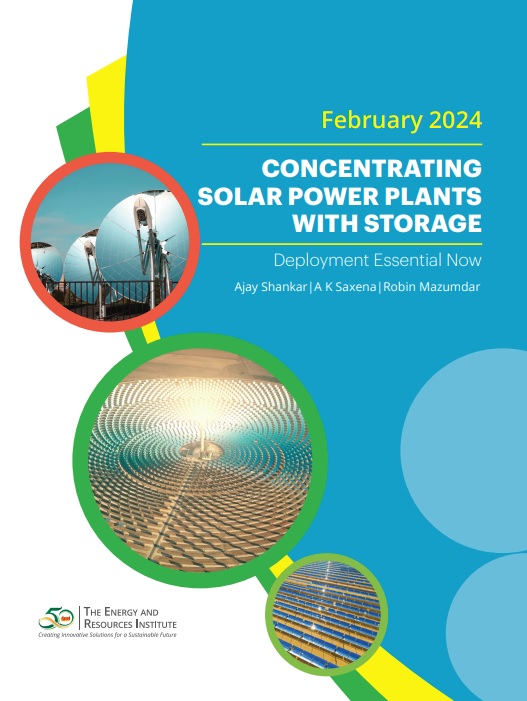 | Concentrating Solar Power Plants with Storage | This TERI report maps the potential of Concentrated Solar Power (CSP) to provide on-demand clean energy in India. Highlighting its ability to deliver dispatchable solar, the study outlines a roadmap—including competitive bidding and domestic manufacturing—to strategically scale CSP and help meet India’s 500 GW non-fossil target by 2030. |
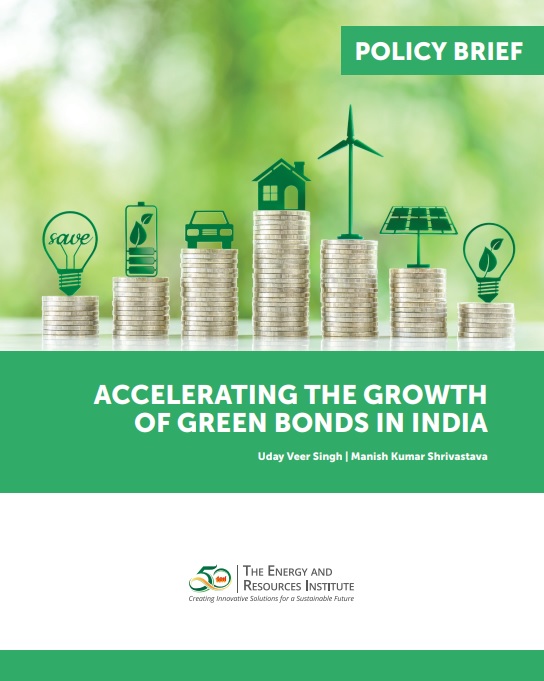 | Accelerating the Growth of Green Bonds in India | India’s low-carbon future requires scaling climate finance beyond public funds. This TERI brief promotes green bonds as a vital private capital conduit. To unlock growth, it urges standardized guidelines, fiscal incentives, and international partnerships to address market gaps and ensure resilient, inclusive financing. |
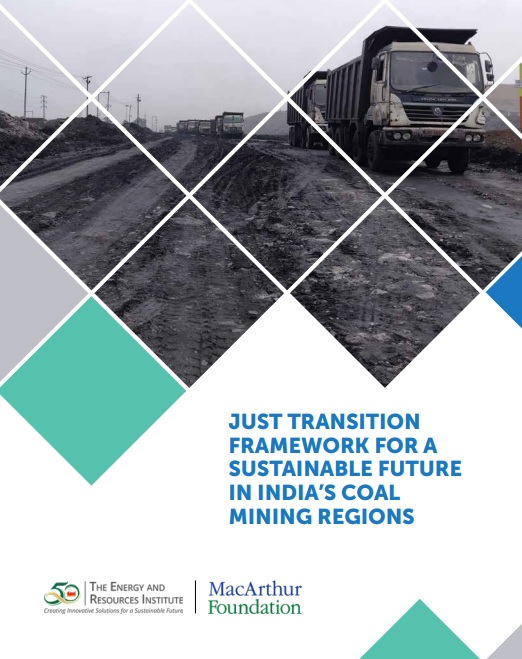 | Just Transition Framework for a Sustainable Future in India’s Coal Mining Regions | As India moves away from coal, ensuring a Just Transition is critical. This TERI framework provides a justice-anchored roadmap for coal-dependent regions. It proposes institutional reforms, economic diversification, and environmental regeneration across all governance levels to transform these regions into resilient, equitable futures. |
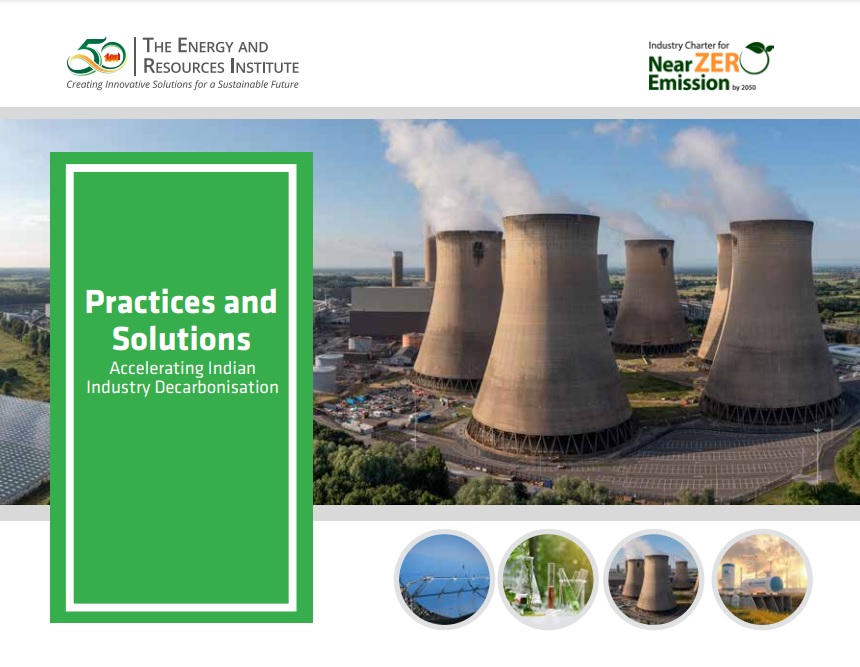 | Practices and Solutions - Accelerating Indian Industry Decarbonisation | India’s industrial transformation is vital for national decarbonization. The TERI-coordinated Industry Charter brings together a coalition committed to Net-Zero by 2050. It guides strategies—spanning hydrogen, CCUS, and electrification—to align business growth with India’s broader climate ambition through peer exchange and high-level engagement. |
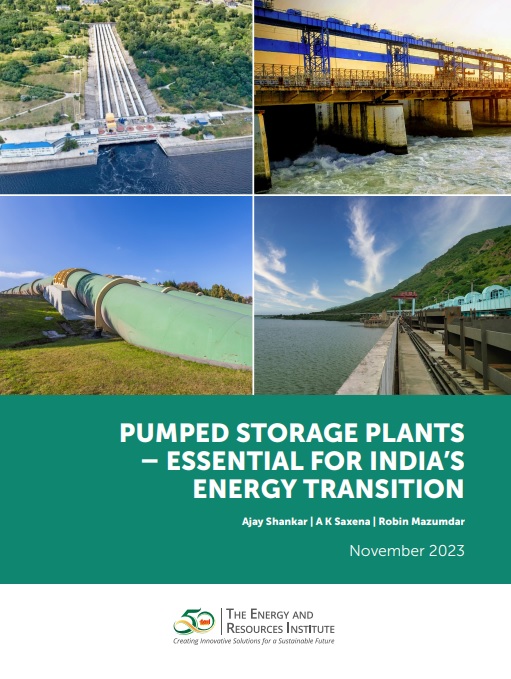 | Pumped Storage Plants - Essential for India’s Energy Transition | As renewables surge, large-scale storage is critical. This TERI paper stresses Pumped Storage Hydropower (PSP) as the most cost-effective solution. To achieve the 500 GW target, the report urges accelerated PSP development by 2030 through incentivized site clearances and new financing mechanisms. |
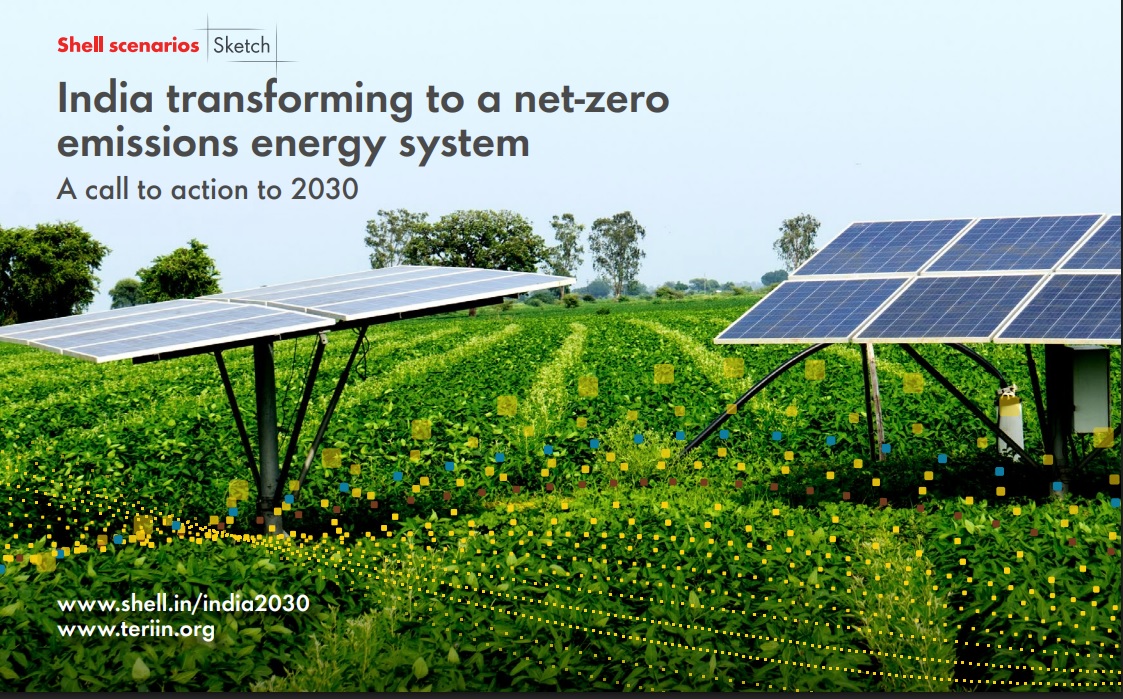 | India Transforming to a Net-Zero Emissions Energy System | India’s transition to low- and zero-carbon energy is critical for achieving climate goals, creating jobs, reducing air pollution, and lowering oil imports. The TERI-Shell report outlines sectoral decarbonization strategies and policies needed to meet 2030 targets and achieve long-term net-zero emissions. |
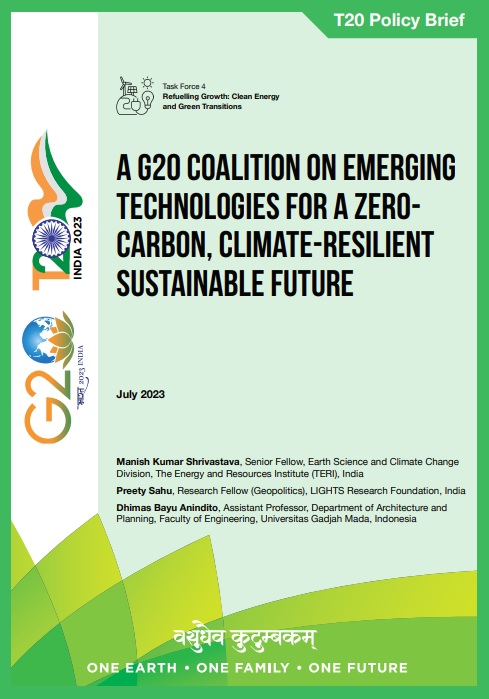 | A G20 Coalition on Emerging Technologies for a Zero-Carbon Climate-Resilient Sustainable Future | Limiting warming to 1.5∘C requires emerging technologies like green hydrogen and carbon capture. This TERI-led T20 brief calls for a G20 Coalition to accelerate their deployment. The report outlines seven guiding principles—including RD&D cooperation and harmonized standards—to secure a zero-carbon, sustainable future. |
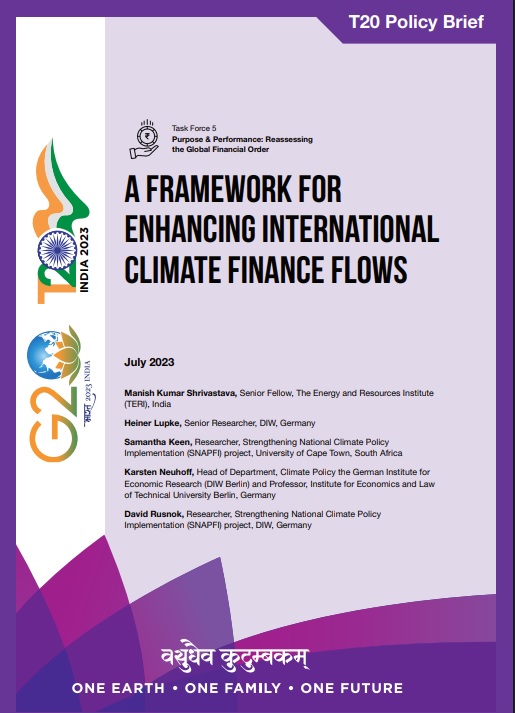 | A Framework for Enhancing International Climate Finance Flows | High capital costs hamper climate finance in developing nations. This T20 brief proposes the G20 foster a network of risk-reduction instruments, like interconnected guarantee funds. These tools, anchored nationally, can lower financing costs and catalyse private investment to deliver affordable, accountable climate action. |
 | Insights from the Cement Sector Decarbonization Road-Map Workshop in India | A TERI workshop mapped India’s cement decarbonization, recommending a strategic sequence of policy, finance, and technology. Key pathways include defining “green cement”, leveraging blended finance for CCUS and alternative cements (LC3), and ensuring a just transition to safeguard socio-economic resilience. |
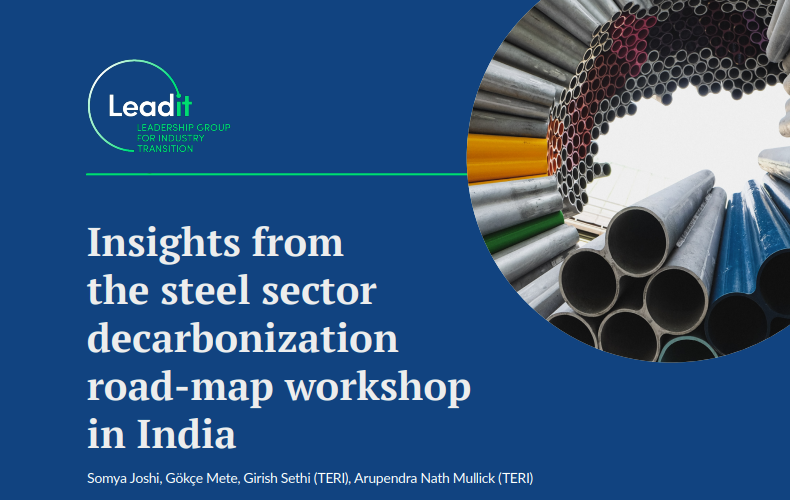 | Insights from the Steel Sector Decarbonization Road-Map Workshop in India | Facing quadruple demand by 2050, India’s steel sector requires deep decarbonization. This TERI workshop highlighted two paths: enhanced circularity and breakthrough technologies (H2-DRI, CCUS). Key policy levers emerged, including defining “green steel” and piloting green hydrogen, to align the sector’s growth with a net-zero trajectory. |
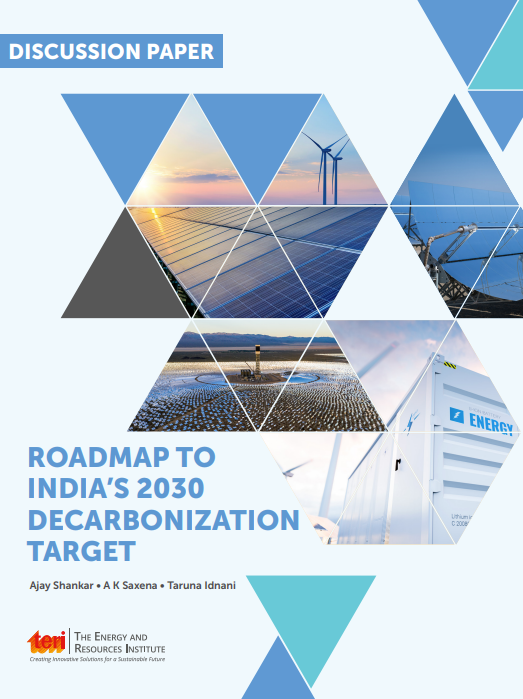 | Roadmap to India’s 2030 Decarbonization Target | Having set ambitious COP26 targets, India must add 340 GW of non-fossil capacity by 2030. This TERI paper calls for proactive planning and a suite of enablers: decentralized solar, offshore wind, and grid-scale storage (hydro/batteries). This ensures a clean, resilient, and reliable energy transition. |
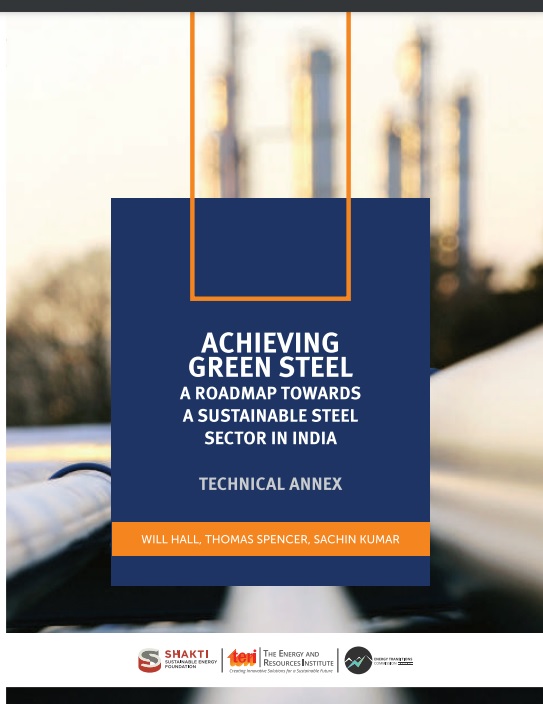 | Achieving Green Steel: A Roadmap Towards a Sustainable Steel Sector in India: Technical Annex | Facing quadruple demand by 2050, India’s steel sector is at a crossroads. This TERI Technical Annex details the sector’s trajectory and outlines mitigation options: enhancing efficiency/recycling, defining green standards, and supporting low-carbon technologies. It provides the technical foundation to steer the industry toward a credible net-zero path. |
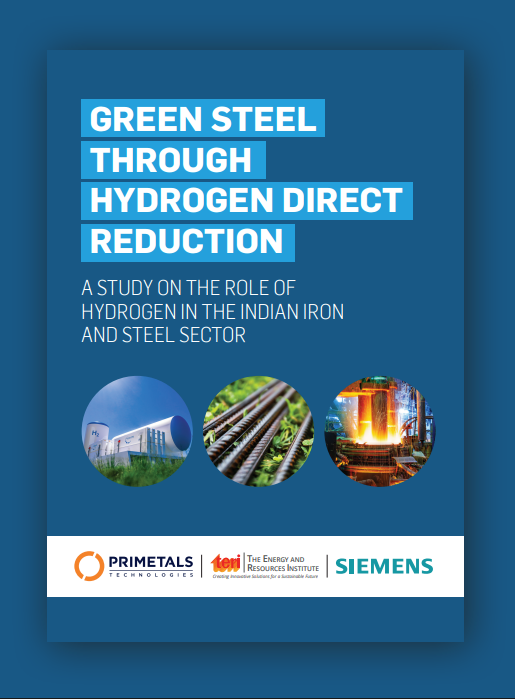 | Green Steel through Hydrogen Direct Reduction: A Study on the Role of Hydrogen in the Indian Iron and Steel Sector | India’s highly carbon-intensive steel sector faces decarbonization. A policy brief spotlights green hydrogen-powered Direct Reduced Iron (DRI) with Electric Arc Furnaces (EAF) as a key low-carbon path, potentially cutting emissions by up to 100 per cent. Success depends on hydrogen prices of US $1−$2/kg, requiring strategic pilots and policy support for India’s green steel transition. |
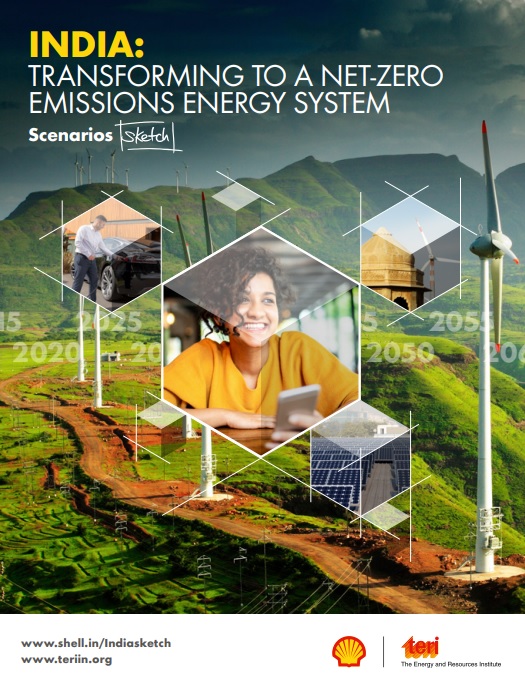 | India Transforming to a Net-Zero Emissions Energy System | India: Transforming to a Net-Zero Emissions Energy System by TERI and Shell, addresses rising energy demand and fossil fuel reliance while highlighting India’s climate commitments. It outlines energy efficiency, electrification, and decarbonized fuels as strategic pillars and provides a roadmap to scale renewables, deploy clean technologies, and invest in carbon removal. |
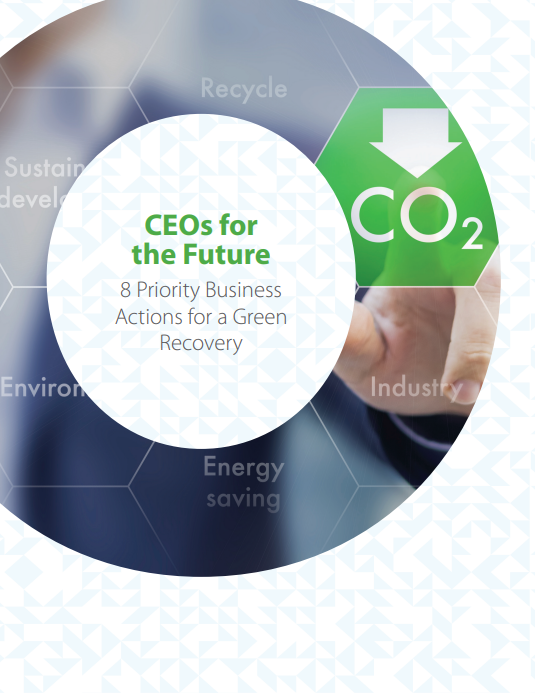 | CEOs for the Future: 8 Priority Business Actions for a Green Recovery | This TERI report summarizes Indian CEOs’ views on climate action and sustainability. It highlights the corporate sector’s role in driving low-carbon transitions, green investments, and climate resilience. The report outlines CEO-led recommendations to align business strategies with India’s net-zero and sustainable development goals. |
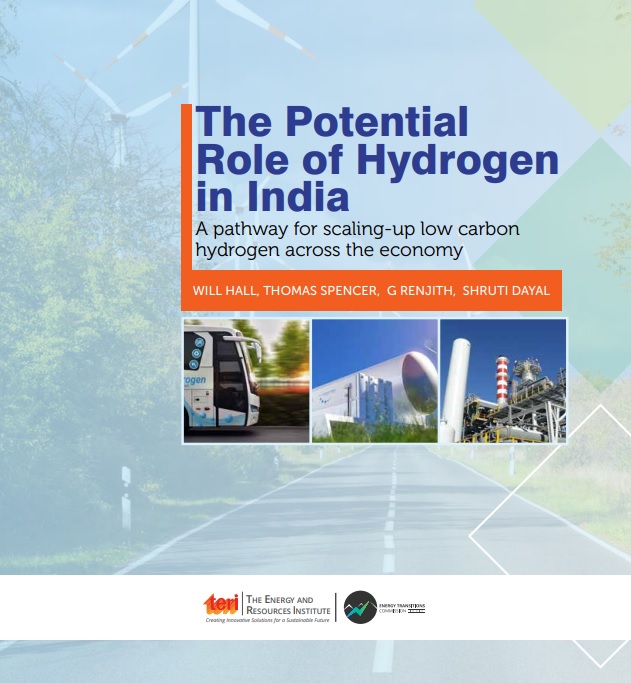 | The Potential Role of Hydrogen in India | India’s low-carbon hydrogen potential is crucial for its clean energy goals. A TERI analysis projects fivefold demand by 2050 across sectors like steel and transport. Green hydrogen costs could halve by 2030, making it competitive. Strategic deployment through industrial clusters and policy incentives can save ∼20 per cent of energy imports (∼$20 billion), boosting energy security. |
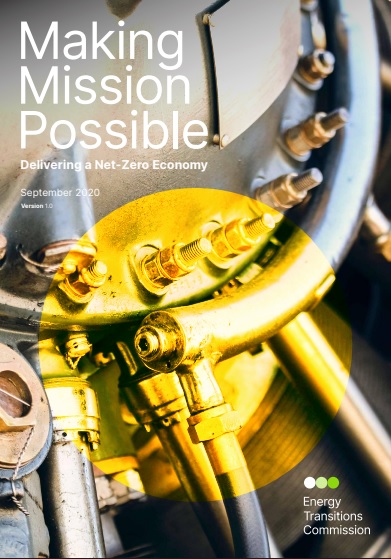 | Making Mission Possible: Delivering a Net-Zero Economy | The Making Mission Possible report maps a practical, technically feasible path to net-zero by decarbonizing energy-intensive sectors like steel, cement, and power. It highlights clean electrification, hydrogen, and carbon capture. Accelerating proven solutions and enacting supportive policies can limit costs to under 0.5 per cent of global GDP, driving sustainable growth and climate impact. |
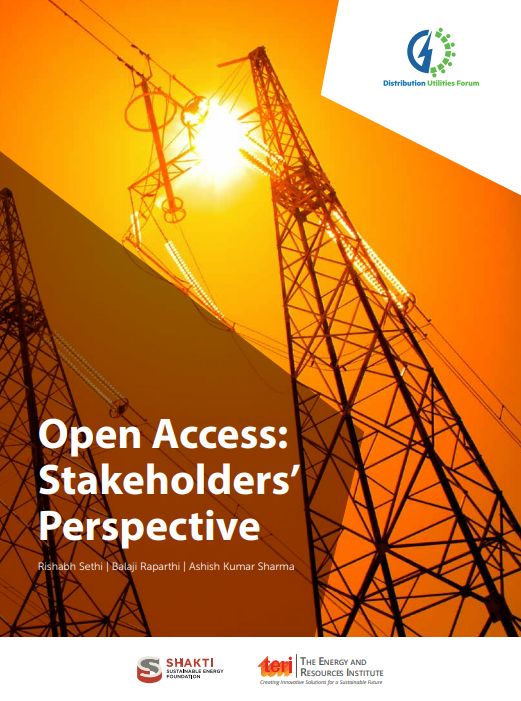 | Open Access: Stakeholders’ Perspective | This TERI report examines open access challenges in India’s electricity distribution, which aims for competition and consumer choice. Growth is limited by regulatory and operational barriers facing DISCOMs. The report offers actionable recommendations to improve open access implementation, fostering a more competitive, efficient power sector. |
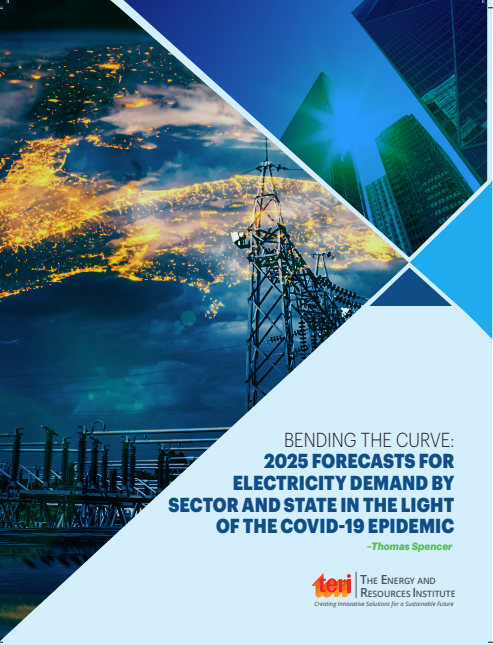 | Bending the Curve: 2025 Forecasts for Electricity Demand by Sector and Indian States in the Light of the COVID-19 Epidemic | The Bending the Curve report projects a 7-17 per cent reduction in India’s electricity demand by 2025 due to the COVID-19 pandemic. It highlights slower industrial/commercial growth and state variations. The report recommends revising tariff structures and optimizing planning to strengthen DISCOMs’ financial resilience for post-pandemic efficiency. |
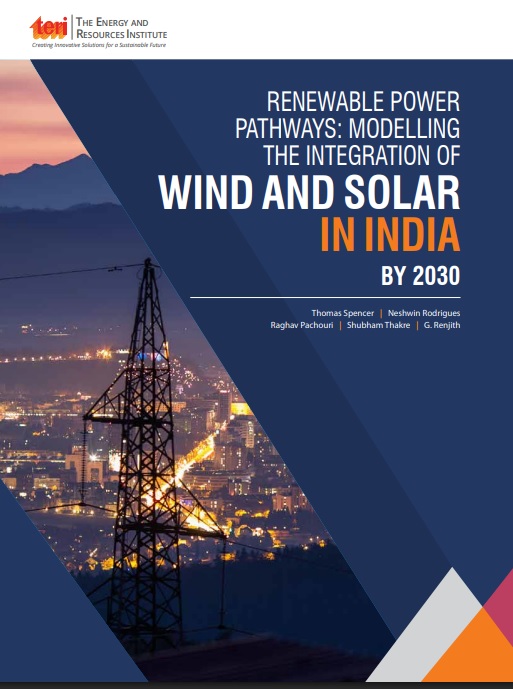 | Renewable Power Pathways: Modelling Integration of Wind and Solar in India by 2030 | The Renewable Power Pathways report examines integrating wind and solar into India’s power system by 2030. It stresses the need for system flexibility via a “National Mission” focusing on optimizing dispatch and expanding storage (battery/pumped hydro). This strategy allows high renewable shares without additional system costs, supporting a resilient energy future. |
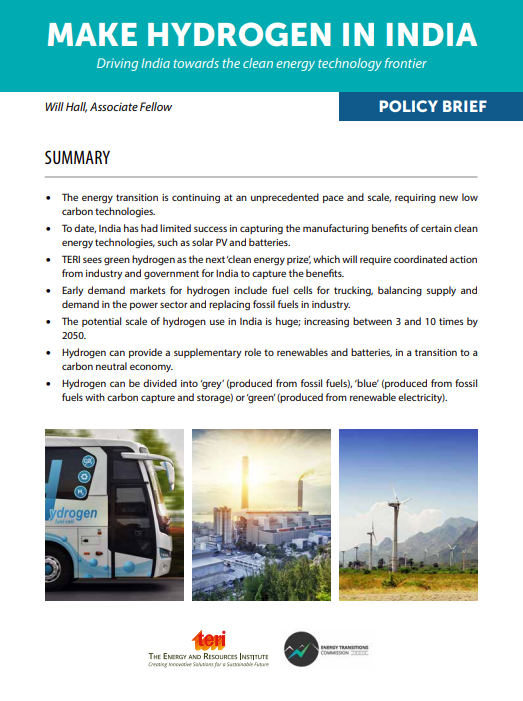 | Make Hydrogen in India: Driving India Towards The Clean Energy Technology Frontier | This Hydrogen Policy Brief stresses green hydrogen’s role in India’s low-carbon transition, replacing limited direct electrification in heavy transport and industry. It projects a three-to-tenfold demand increase by 2050, contingent on supportive policies. Recommendations include a national mission, public-private partnerships, and domestic manufacturing for energy security. |
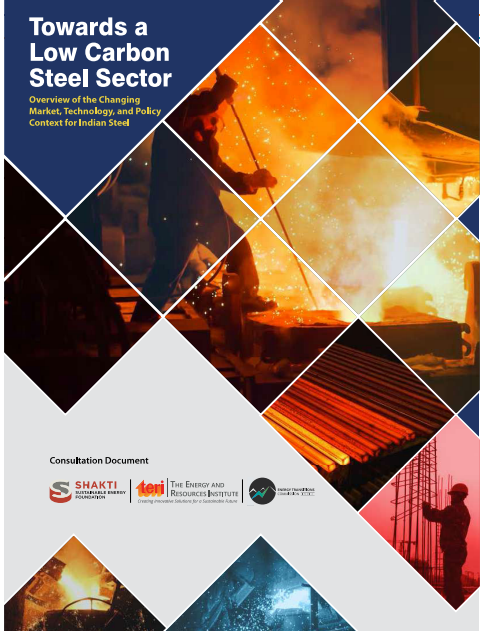 | Towards a Low Carbon Steel Sector: Overview of the Changing Market, Technology, and Policy Context for Indian Steel | The Towards a Low Carbon Steel Sector report urges India to decarbonize its steel industry, a projected significant emissions source by 2050. Key levers are energy efficiency, increased scrap use, and cleaner technologies (e.g., hydrogen-based DRI/EAF). A comprehensive policy framework supporting R&D and finance is vital for India’s near-zero emissions goal. |
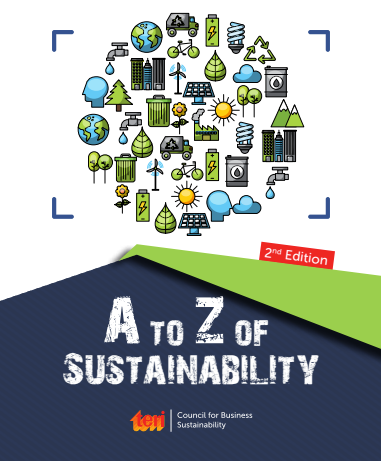 | A to Z of Sustainability | The A–Z Dictionary of Sustainability by TERI is a timely guide clarifying the environmental, social, economic, and governance terms central to the sustainability transition. It helps policymakers, professionals, and citizens understand, communicate, and act on complex sustainability challenges, supporting the wider adoption of sustainable practices. |
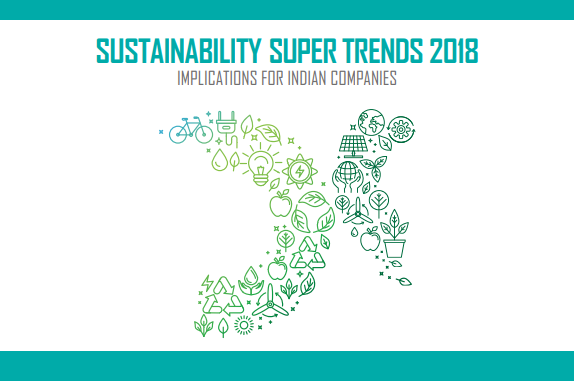 | Sustainability Super Trends-2018: Implications for Indian Companies | The TERI Sustainability Trends 2018 report identifies super trends like resource scarcity and climate risks pressuring Indian businesses. It highlights that sustainability is crucial for long-term resilience. Companies must move beyond compliance, integrating sustainability into core operations to mitigate risks, foster innovation, and enhance competitiveness. |
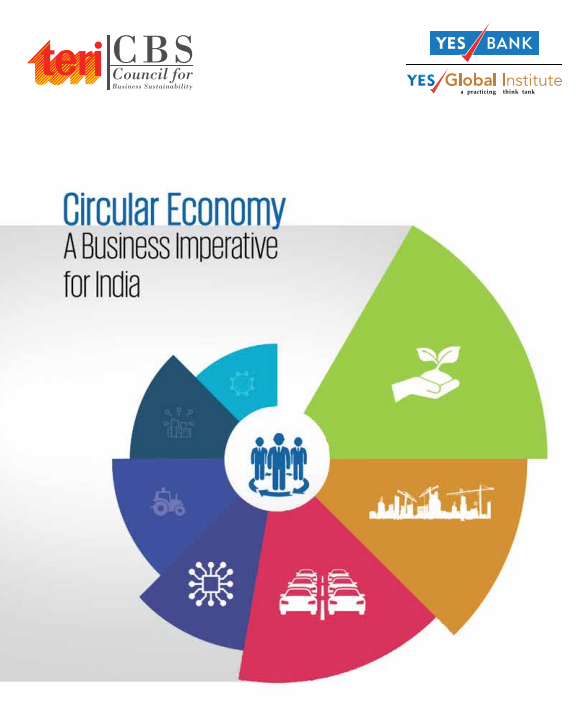 | Circular Economy - A Business Imperative for India | The Circular Economy report by TERI and YES BANK urges India to shift from a linear to a circular economic model. It identifies agriculture, automotive, construction, and electronics as key sectors. The report offers a ‘Material Circularity Indicator’ for businesses and provides a roadmap of policies and finance to boost resource efficiency and long-term competitiveness. |
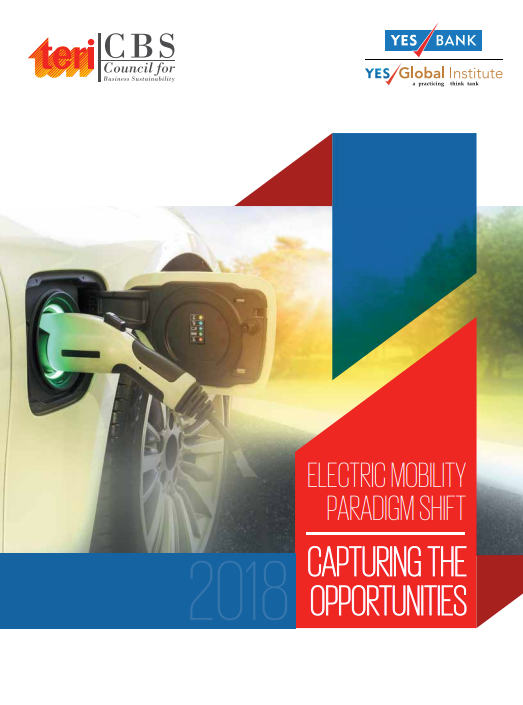 | Electric Mobility Paradigm Shift | The Electric Mobility Paradigm Shift report stresses EVs’ potential to decarbonize India’s transport, cutting pollution and emissions. It identifies barriers like high costs and limited charging. The report proposes demand aggregation, green financing, and policy incentives to accelerate adoption, building a robust ecosystem for a sustainable and inclusive mobility future. |
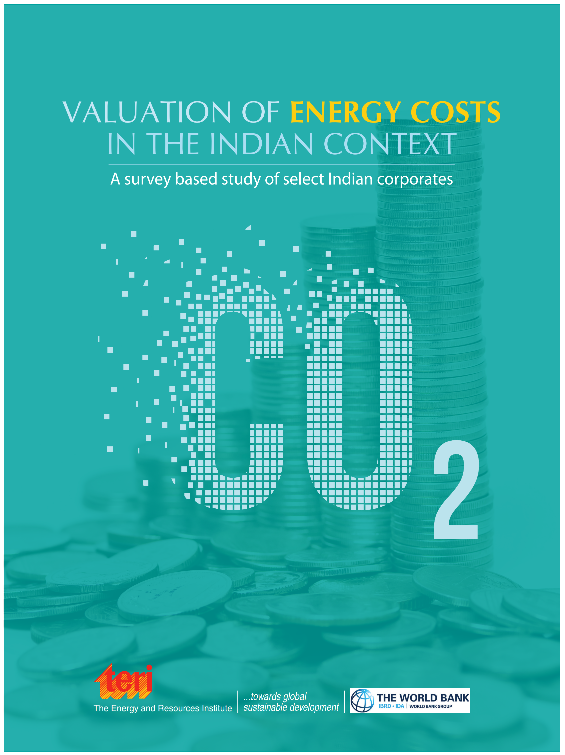 | Valuation of Energy Costs in the Indian Context | This TERI survey-based study assesses how Indian corporates are prepared to internalize the true cost of energy and carbon, including through internal carbon pricing. Consulting 150+ business leaders, the report highlights practices and opportunities for India Inc. to mainstream energy valuation as a strategic tool for efficiency and low-carbon competitiveness. |
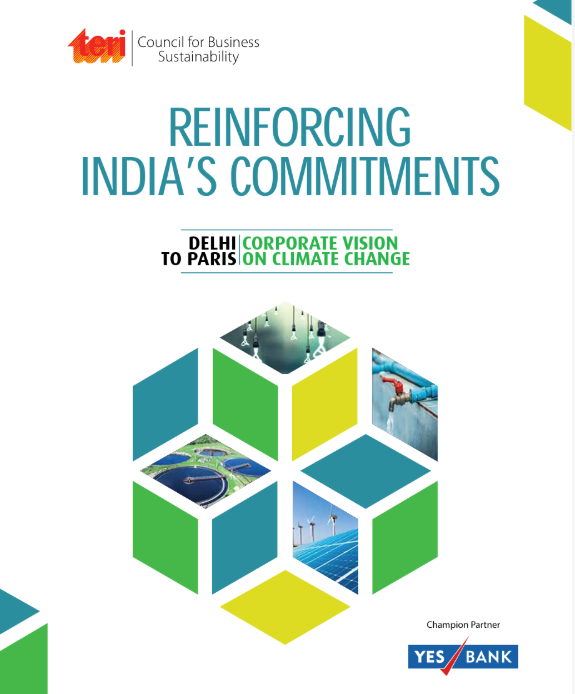 | Reinforcing India’s Commitments - Delhi to Paris: Corporate Vision on Climate Change | The Delhi to Paris report identifies challenges like rising energy demand and highlights government schemes (e.g., PAT). It outlines strategic pathways for enhancing energy efficiency, expanding renewable energy, and fostering climate resilience across Indian sectors. |
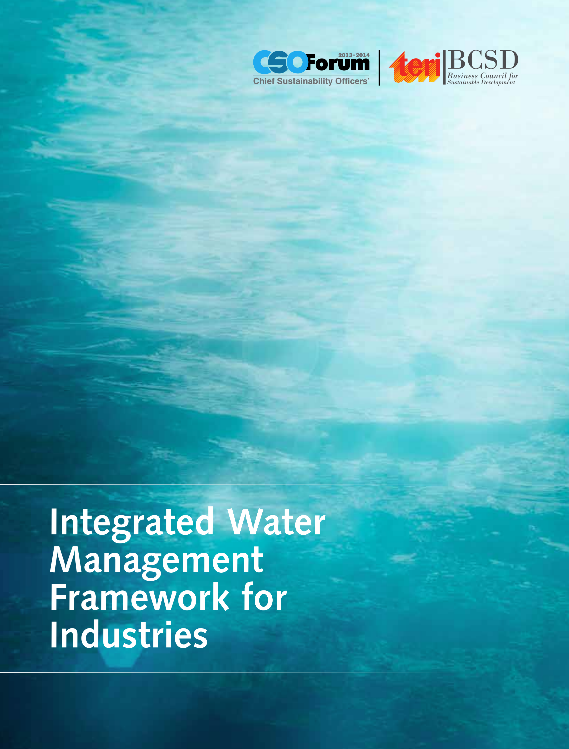 | Integrated Water Management Framework for Industries | Declining water availability and tripling industrial demand by 2025 make water a defining risk. TERI’s Integrated Water Management Framework offers a step-by-step approach for corporates to map, assess, and reduce their water footprint via conservation and zero liquid discharge. Holistic water stewardship is key to business resilience. |
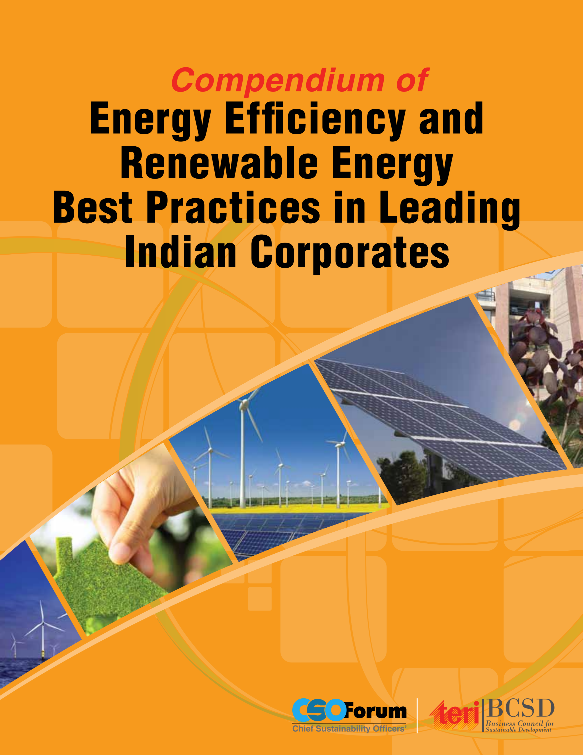 | Compendium of Energy Efficiency and Renewable Energy Best Practices | This TERI compendium highlights energy efficiency as the most cost-effective lever for India’s emissions reduction and competitiveness. It showcases pioneering case studies across power, transport, industry, and buildings. Documenting replicable best practices and measurable savings, the report positions efficiency as a strategic pathway for sustainable growth and resource security. |
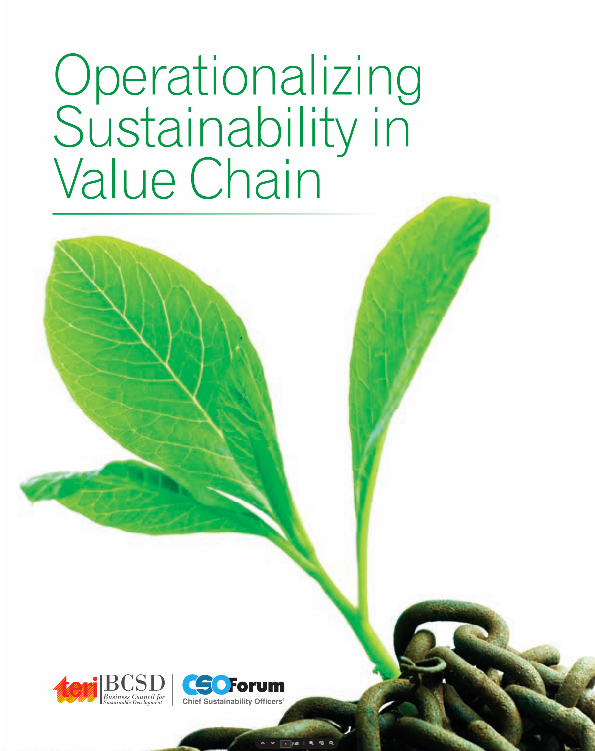 | Operationalizing Sustainability in Value Chain | The TERI paper on Operationalising Sustainability in Value Chains urges Indian businesses to integrate ESG across upstream, instream, and downstream operations. It provides a step-by-step framework, sectoral guidance (manufacturing/finance), and practical tools to enhance cost efficiencies, risk management, and brand equity, strengthening competitiveness for India’s sustainable growth. |
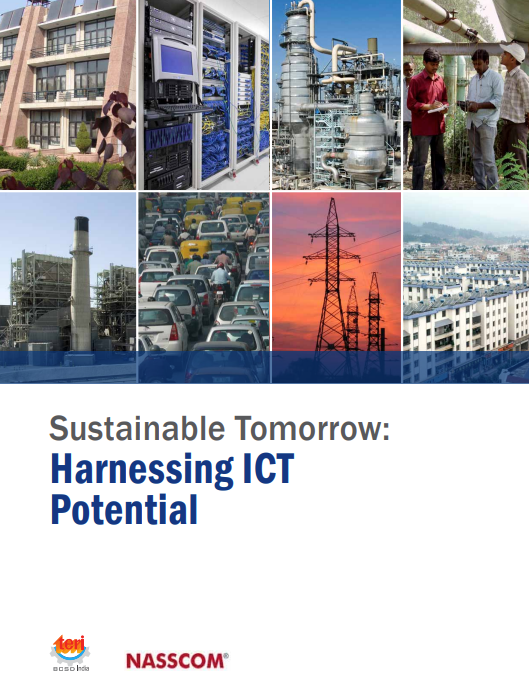 | Sustainable Tomorrow - Harnessing ICT Potential | The TERI-NASSCOM report highlights ICT’s potential to drive sustainability by reducing its environmental footprint and enabling energy efficiency across sectors. It provides a roadmap for integrating ICT into India’s climate strategies, supporting innovation and emission reductions under frameworks like NAPCC. |
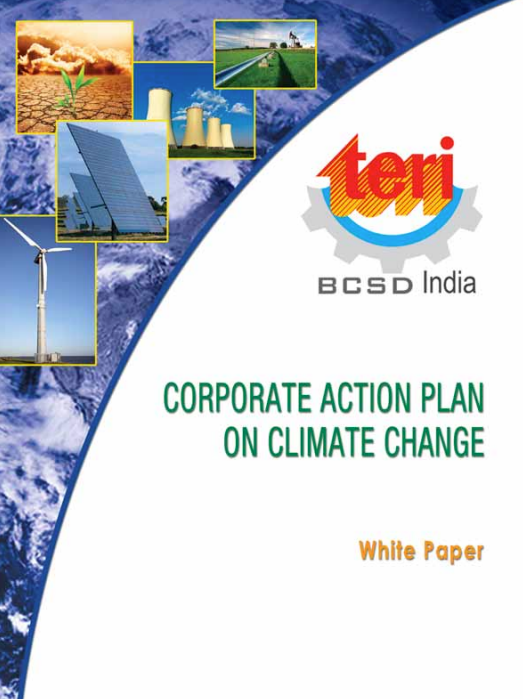 | Corporate Action Plan on Climate Change | The Corporate Action Plan on Climate Change addresses critical environmental issues through eight missions. These include solar energy, enhanced energy efficiency, sustainable habitat, water, sustaining the Himalayan ecosystem, a Green India, sustainable agriculture, and strategic knowledge for climate change. |
